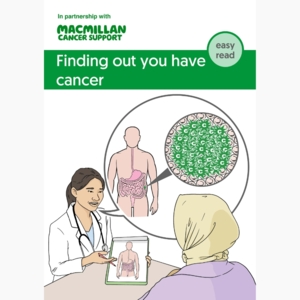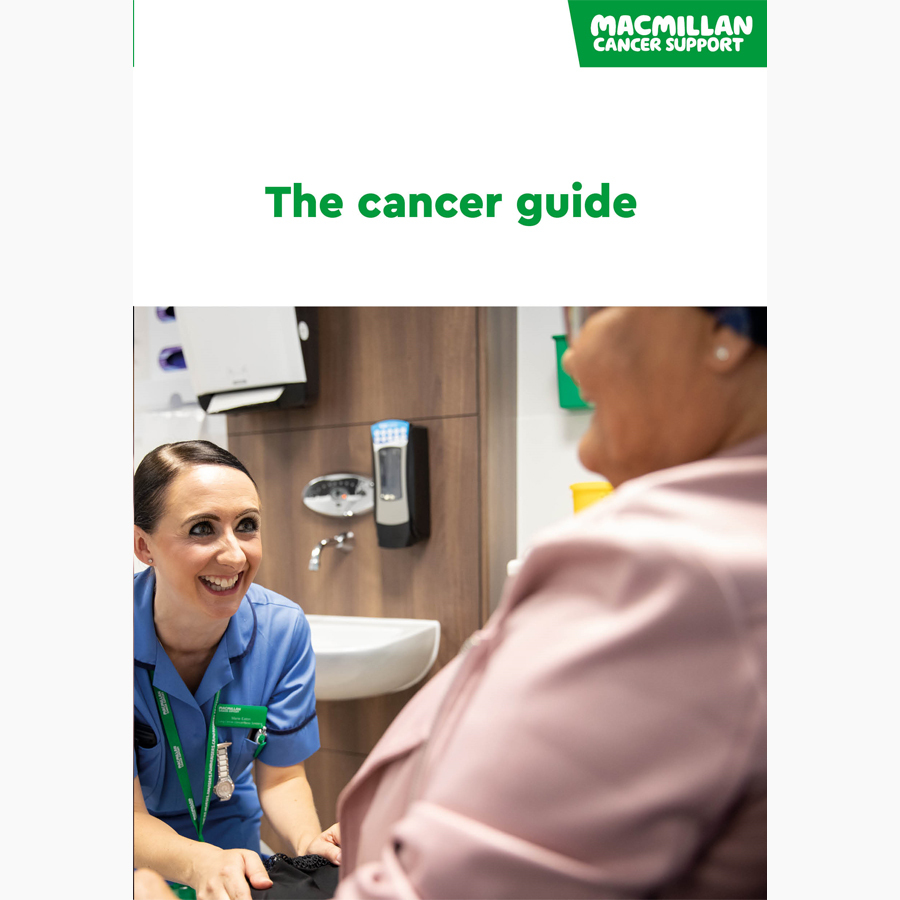Just been diagnosed?
If you have just been diagnosed with cancer, find out more about what happens next and where to find information and support.
On this page
-
Getting a cancer diagnosis
-
What happens after a cancer diagnosis?
-
Getting support after a cancer diagnosis
-
Finding information about cancer diagnosis
-
What about work and money?
-
Eating well and keeping active
-
Pregnant and diagnosed with cancer
-
Supporting someone who has just been told they have cancer
-
Do you want to receive trusted information by email?
-
About our information
-
How we can help
Getting a cancer diagnosis
Finding out that you have cancer can be a shock. You may have lots of questions. Or you may just need time to think about what you have been told. There is no right or wrong way to feel.
When you feel ready, the information below might help.
Related pages
What happens after a cancer diagnosis?
After a cancer diagnosis, you meet a cancer doctor or specialist nurse to talk about your treatment plan.
How quickly this appointment is arranged may depend on the type of cancer. You usually get the details for this appointment by letter, phone or text message.
If you are worried that you have missed the appointment details, ask your GP or the doctor who arranged your cancer tests to check for you.
At your appointment, you can ask any questions. The cancer doctor or specialist nurse will give you information about your treatment options to help you make a decision about the treatment you want.
They should give you information in a language and format that you can use, and make sure that you understand.
The doctor or nurse will also explain when your treatment may start. They can talk to you about any support you need.
We have more information about:
- How your cancer team plans your treatment.
- Making treatment decisions.
Getting support after a cancer diagnosis
When you are told you have cancer, you may have many different emotions and worries. These can be difficult to cope with.
You may get support from your healthcare team. Your GP, cancer doctor or specialist nurse are often able to talk to you about what is happening and how you feel. They may be able to arrange more support or someone else for you to talk to. You can also check for cancer information and support in your area.
Talking to family or friends may also help. But sometimes it is hard to start a conversation about cancer. You may find it useful to read our information about talking about your cancer diagnosis.
Macmillan is also here to support you. You can:
- Call the Macmillan Support Line for free on 0808 808 00 00.
- Chat to our specialists online
- Visit our Online Community to talk with people who are dealing with cancer, share your experience, and ask an expert your questions.
Related pages
Finding information about cancer diagnosis
You may have questions about the type of cancer you have been diagnosed with. When you meet your cancer doctor or specialist nurse, they will give you information and may be able to answer your questions
You may want to learn about the type of cancer before this appointment. You can use our Cancer A to Z to find more information about different types of cancer. This can help you understand what to expect. But you may find information that is scary or unexpected, and which causes worry.
You may also decide to wait for your appointment. This means the information you get is correct for your situation.
Related pages
Booklets and resources
Now what? Podcast series
The cancer service at Guy's and St Thomas's hospital have worked with people with cancer to develop a free podcast to support people when they receive a cancer diagnosis.
The 10 episodes cover key stages that people will go through such as diagnosis or hospital admission. In each episode, people with cancer tell their stories and cancer health care professionals give practical advice and signpost to support.
What about work and money?
When you are affected by cancer, you might need help with extra costs. Or you might have questions about how diagnosis and treatment might affect your work life. We have more information about:
- money, finance and insurance – including claiming benefits and managing your finances
- work and cancer – including your rights at work, sick pay and what to expect from your employer.
Our specialist money advisers can give you free and confidential advice and help you to find out what benefits you might be entitled to. You can talk to our advisors about work and money by calling the Macmillan Support Line for free on 0808 808 0000. Money advisers are available Monday to Friday, 8am to 6pm.
Eating well and keeping active
You can help yourself get ready for treatment by eating a healthy diet and keeping active. Even small changes to the way you eat, or moving a little more, can help.
If you smoke, stopping is one of the best things you can do for your health. Giving up smoking may:
- make some cancer treatments more effective
- reduce your risk of side effects
- help you recover faster after treatment.
We have more information about:
What is prehabilitation?
Your cancer team may give you information about prehabilitation (also called prehab) as you prepare to have treatment. Prehab means getting as ready for treatment as you can. To help you prepare, your team usually gives you advice and support about:
- exercise
- healthy diet and weight
- mental health and wellbeing.
Prehab helps you cope physically and mentally with the cancer treatment. It may also improve your health and wellbeing after treatment.
Pregnant and diagnosed with cancer
If you are pregnant and have just been diagnosed with cancer, you may have additional questions and worries.
We have more information about pregnancy and cancer.
Supporting someone who has just been told they have cancer
When someone close to you is diagnosed with cancer it can be hard to know how to help them or even what to say. You might find it helpful to read our tips for talking to someone with cancer. Or our information about supporting someone with cancer.
It is often useful to talk to someone who is in a similar situation. Our Online Community has groups for carers, and for family and friends.
Related pages
About our information
-
References
Below is a sample of the sources used in our diagnosis and staging information. If you would like more information about the sources we use, please contact us at cancerinformationteam@macmillan.org.uk
NICE. Suspected cancer: recognition and referral. NICE guideline [NG12]. Published: 23 June 2015. Last updated: 15 December 2021. Available https://www.nice.org.uk/guidance/ng12 (accessed June 2022).
Scottish Government. Scottish referral guidelines for suspected cancer. Jan 2019. Available https://www.gov.scot/publications/scottish-referral-guidelines-suspected-cancer-january-2019/ (accessed June 2022).
Northern Ireland Cancer Network (NICaN) Board. Northern Ireland Referral Guidance for Suspected Cancer. May 2007 Available http://www.belfasttrust-cancerservices.hscni.net/images/NICANReferralGuidanceMay2007.pdf (accessed June 2022).
-
This information has been written, revised and edited by Macmillan Cancer Support’s Cancer Information Development team. It has been approved by members of Macmillan’s Centre of Clinical Expertise.
Our cancer information has been awarded the PIF TICK. Created by the Patient Information Forum, this quality mark shows we meet PIF’s 10 criteria for trustworthy health information.
The language we use
We want everyone affected by cancer to feel our information is written for them.
We want our information to be as clear as possible. To do this, we try to:
- use plain English
- explain medical words
- use short sentences
- use illustrations to explain text
- structure the information clearly
- make sure important points are clear.
We use gender-inclusive language and talk to our readers as ‘you’ so that everyone feels included. Where clinically necessary we use the terms ‘men’ and ‘women’ or ‘male’ and ‘female’. For example, we do so when talking about parts of the body or mentioning statistics or research about who is affected.
You can read more about how we produce our information here.
Date reviewed

Our cancer information meets the PIF TICK quality mark.
This means it is easy to use, up-to-date and based on the latest evidence. Learn more about how we produce our information.
How we can help






